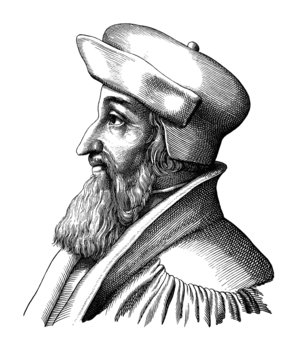
Johannes Oecolampadius
1482–1531
The Monastery’s Lost Houselamp
By Douglas Wilson
The first thing we should do is get the issue of the name out of the way. Let us not stumble over the name. If he lived among us today in North America, we would call him John Houselamp. His German surname was Hussgen, which John himself worked into the Greek form (as was customary at the time).
In this brief overview of this talented man’s contribution to the great Reformation, perhaps we should just call him John.
“I Have Lost the Monk”
John was born in Germany in 1482, ten years before Columbus sailed the ocean blue. As Calvin is associated with Geneva, Bucer with Strasbourg, and Luther with Wittenberg, John Oecolampadius is associated with Basel. He was one of the rising tribe of humanist scholars, thoroughly trained in Greek, Latin, and Hebrew. By 1515, John had attained the post of cathedral preacher in Basel.

While in Basel, he worked as an assistant to Erasmus — the project being Erasmus’s first edition of the Greek New Testament, for which John wrote the epilogue. John was a humanist scholar who went over to the Reformation, while Erasmus was a humanist scholar who remained in the Roman communion. This was a time of spiritual turmoil for John, resulting in him becoming a monk. But he soon decided that was not right, saying, “I have lost the monk; I have found the Christian.”
A German Choir
He left Basel for a time, but returned in 1522 when he assumed a post at the University of Basel. He was a scholarly and effective participant in various disputations — which was one of the ways that cities made their decisions — and as a result, the leaders of Basel decided to join forces with the Reformation. The Mass was abandoned in Basel by 1529.
This was a time of genuine spiritual quickening, as was demonstrated by the following incident:
At about this time, God honored Oecolampadius and his church with something spectacular. Normally a choir gave short responses in Latin at various prescribed liturgical moments in the worship service. However, on Easter Sunday, the congregation in St. Martin’s spontaneously broke out in German singing during the service. Nothing like this had happened anywhere. The Council immediately forbade such singing. The congregation responded by continuing to do it. (Reformer of Basel, 19–20)
Marriage and Controversy
One interesting detail relates to John’s decision to marry in 1528. His wife was a widow named Wibrandis, who, after John passed away, married another Reformation leader, Wolfgang Capito. After he passed away, she married another Reformer, Martin Bucer. These things happen of course. But not that often.
On the matter of the Lord’s Supper, the reformational world was divided between the respective views of the Lutherans, the Calvinists, and the Zwinglians. The Lutherans held to a physical presence of Christ in the Supper, the Calvinists held to a spiritual presence, and the Zwinglians held to a memorialist position.
Basel is only 54 miles from Zurich, where Zwingli was ministering. John grew close to Ulrich Zwingli, working together with him, and came to hold Zwingli’s position on the Lord’s Supper. In 1529, John participated in the Marburg Colloquy, together with Zwingli, Luther, Bucer, Melanchthon, and others, in an unsuccessful bid for Protestant unity on the Supper.
When Zwingli was killed in battle, in 1531, John took the shocking news very hard, and died himself shortly after.
Recent Comments